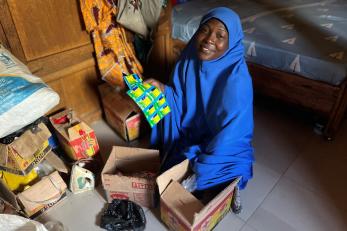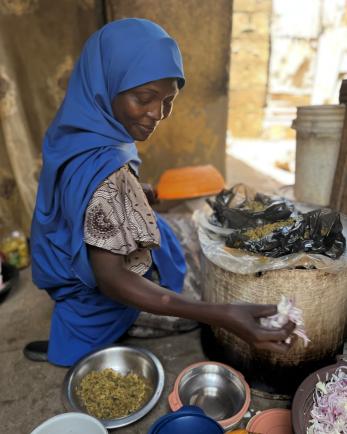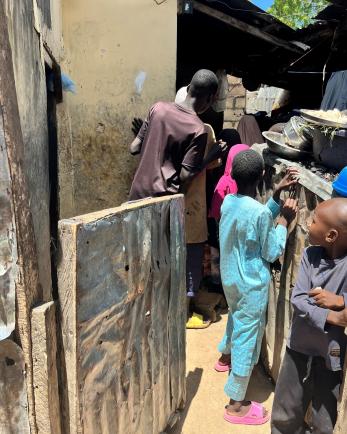Center for Microenterprise Development: empowering market women to shine brighter by fostering economic resilience

“I am a market woman”, Husseina Suleiman says as she swiftly serves the food into plastic bags, with the joyful chatter of children waiting in line in the background. She takes the money from her customers and hands back the change by calculating quickly in her head, never missing a beat in our conversation. “The joy of business is having products that customers come for,” Husseina says with a bright smile.
Husseina is one of the participants of a loan scheme developed through The USAID-funded Feed the Future Nigeria, Rural Resilience Activity (RRA). Implemented by Mercy Corps, in partnership with the International Fertilizer Development Center (IFDC) and Save the Children International (SCI), RRA links private-sector players' finances that allow them to expand their businesses, despite living in conflict-affected areas of Northeast Nigeria
The improved access to finance is made possible through a strategic partnership between RRA and the Center for Microenterprise Development (CMD), an organization dedicated to empowering local communities through business development services and improving access to finance.RRA orchestrated an alliance between CMD and a commercial bank, First City Monument Bank (FCMB) to serve as a guarantor to small businesses while reducing risk for FCMB. This innovative approach resulted in larger loans with reduced interest rates, a breakthrough for small business owners and farmers alike.

The vast majority of Nigerian MSMEs face chronic underfunding, with only about 15% of MSMEs having access to formal credit, despite the fact that MSMEs account for more than 45% of the country’s GDP. This partnership could be a game-changer, aiming to democratize access to commercial bank loans for MSMEs and smallholder farmers. “It is rare to meet people who trust you before your business grows, especially if you are in petty trading. CMD trusted me”, testifies Husseina.
But it wasn't just about accessibility. RRA and CMD conditioned the loans to meet the unique needs of the last-mile customers. Rather than cash, some loans were provided in the form of agricultural products, aiding access to quality inputs. The process was expedited to assist farmers in need before planting season, and a service charge replaced interest to meet the demand from Muslim borrowers. CMD's deep understanding of the farmers and MSME owners they serve placed these individuals at the heart of this partnership.
For Husseina, it was the personal touch that sealed the deal. CMD agents entered her community to explain the product in simple terms she could understand, sparking her interest and encouraging her to take the opportunity. Another market woman, echoing Husseina's sentiment, states, “I used to be afraid of disgracing myself by not being able to complete the loan payment when I do not understand how the repayment process works. CMD changed that perception”.
Before she received the loan, Husseina supplemented the household income mainly by rearing livestock and sowing clothes. However, it put her under a great deal of stress to take care of her large family of 9 children as well as her parents-in-law and grandparents-in-law. With the loan, she started selling daily necessities she could sell from home and started her food business as well as buying extra livestock. It allowed her to diversify her income streams and provided her with a stronger sense of security.

Yet, she confesses that her income has not seen much increase. The inflation rate for food in Nigeria reached 27% in July 2023, a record-high in 10 years. The price of a pot of Nigerian staple, jollof rice, more than doubled since 2016. Husseina is proud that she beats inflation by expanding and diversifying her sources of income. “With my business growing, people respect me now. I even give out small loans to my community members ”, Husseina speaks as she beams with pride. She adds, “My next goal is to get another loan to stock up on raw materials to keep my business, as the prices are soaring”.
The partnership between RRA, CMD, and FCMB resulted in the provision of loans to 164 beneficiaries in the first half of 2023 with a 100% repayment rate. CMD and FCMB have ambitious plans to extend their reach, aiming to empower an additional 2,000 beneficiaries by the end of the year.
For Husseina and countless other MSME owners in Nigeria, the opportunity to receive loans has never been more crucial. It is the lifeline that allows them to maintain and propel their businesses in the face of formidable economic shocks and one that reveals the remarkable resilience that resides within them, shining brightly in the face of adversity.